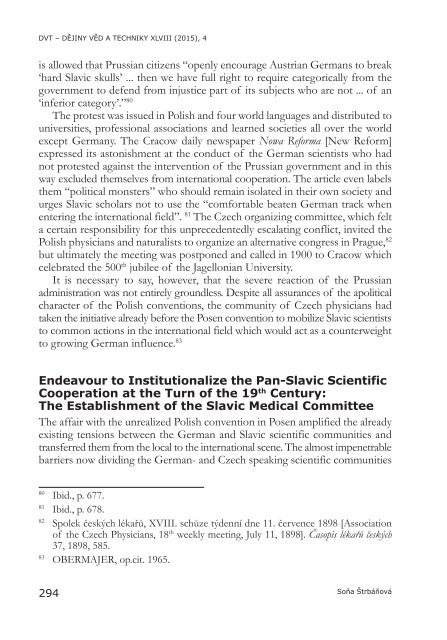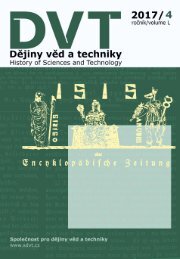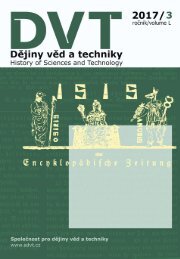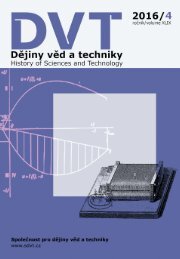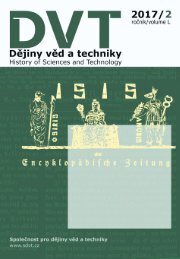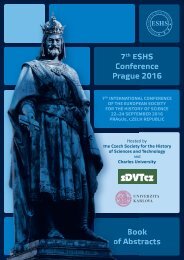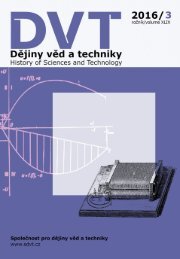Dějiny věd a techniky 2015, 4
Číslo je věnováno 7. mezinárodní konferenci Evropské společnosti pro dějiny vědy, která se konala 22.–24. září 2016 v Praze.
Číslo je věnováno 7. mezinárodní konferenci Evropské společnosti pro dějiny vědy, která se konala 22.–24. září 2016 v Praze.
You also want an ePaper? Increase the reach of your titles
YUMPU automatically turns print PDFs into web optimized ePapers that Google loves.
DVT – DĚJINY VĚD A TECHNIKY XLVIII (<strong>2015</strong>), 4<br />
is allowed that Prussian citizens “openly encourage Austrian Germans to break<br />
‘hard Slavic skulls’ ... then we have full right to require categorically from the<br />
government to defend from injustice part of its subjects who are not ... of an<br />
‘inferior category’.” 80<br />
The protest was issued in Polish and four world languages and distributed to<br />
universities, professional associations and learned societies all over the world<br />
except Germany. The Cracow daily newspaper Nowa Reforma [New Reform]<br />
expressed its astonishment at the conduct of the German scientists who had<br />
not protested against the intervention of the Prussian government and in this<br />
way excluded themselves from international cooperation. The article even labels<br />
them “political monsters” who should remain isolated in their own society and<br />
urges Slavic scholars not to use the “comfortable beaten German track when<br />
entering the international field”. 81 The Czech organizing committee, which felt<br />
a certain responsibility for this unprecedentedly escalating conflict, invited the<br />
Polish physicians and naturalists to organize an alternative congress in Prague, 82<br />
but ultimately the meeting was postponed and called in 1900 to Cracow which<br />
celebrated the 500 th jubilee of the Jagellonian University.<br />
It is necessary to say, however, that the severe reaction of the Prussian<br />
administration was not entirely groundless. Despite all assurances of the apolitical<br />
character of the Polish conventions, the community of Czech physicians had<br />
taken the initiative already before the Posen convention to mobilize Slavic scientists<br />
to common actions in the international field which would act as a counterweight<br />
to growing German influence. 83<br />
Endeavour to Institutionalize the Pan-Slavic Scientific<br />
Cooperation at the Turn of the 19 th Century:<br />
The Establishment of the Slavic Medical Committee<br />
The affair with the unrealized Polish convention in Posen amplified the already<br />
existing tensions between the German and Slavic scientific communities and<br />
transferred them from the local to the international scene. The almost impenetrable<br />
barriers now dividing the German- and Czech speaking scientific communities<br />
80<br />
Ibid., p. 677.<br />
81<br />
Ibid., p. 678.<br />
82<br />
Spolek českých lékařů, XVIII. schůze týdenní dne 11. července 1898 [Association<br />
of the Czech Physicians, 18 th weekly meeting, July 11, 1898]. Časopis lékařů českých<br />
37, 1898, 585.<br />
83<br />
OBERMAJER, op.cit. 1965.<br />
294<br />
Soňa Štrbáňová


